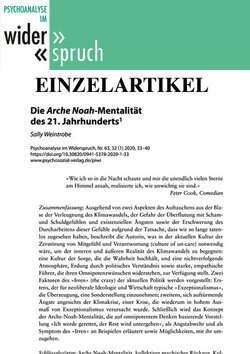8 Seiten, PDF-E-Book
Erschienen: Juni 2020
Bestell-Nr.: 22466
https://doi.org/10.30820/0941-5378-2020-1-33
abonnieren
Sally Weintrobe
Die Arche Noah-Mentalität des 21. Jahrhunderts (PDF)
Sofortdownload
Dies ist ein E-Book. Unsere E-Books sind mit einem personalisierten Wasserzeichen versehen,
jedoch frei von weiteren technischen Schutzmaßnahmen (»DRM«).
Erfahren Sie hier mehr zu den Datei-Formaten.
Ausgehend von zwei Aspekten des Auftauchens aus der Blase der Verleugnung des Klimawandels, der Gefahr der Überflutung mit Schamund Schuldgefühlen und existenziellen Ängsten sowie der Erschwerung des Durcharbeitens dieser Gefühle aufgrund der Tatsache, dass wir so lange tatenlos zugesehen haben, beschreibt die Autorin, was in der aktuellen Kultur der Zerstörung von Mitgefühl und Verantwortung (culture of un-care) notwendig wäre, um der inneren und äußeren Realität des Klimawandels zu begegnen: eine Kultur der Sorge, die die Wahrheit hochhält, und eine nichtverfolgende Atmosphäre, Erdung durch politisches Verständnis sowie starke, empathische Führer, die ihren Omnipotenzwünschen widerstehen, zur Verfügung stellt. Zwei Faktoren des »Irren« (the crazy) der aktuellen Politik werden vorgestellt: Erstens, der für neoliberale Ideologie und Wirtschaft typische »Exzeptionalismus«, die Überzeugung, eine Sonderstellung einzunehmen; zweitens, sich auftürmende Ängste angesichts der Klimakrise, einer Krise, die wiederum in hohem Ausmaß von Exzeptionalismus verursacht wurde. Schließlich wird das Konzept der Arche-Noah-Mentalität, die auf omnipotentem Denken basierende Vorstellung »Ich werde gerettet, der Rest wird untergehen«, als Angstabwehr und als Symptom des »Irren« an Beispielen erläutert sowie Möglichkeiten, mit ihr umzugehen.
Abstract:
Based on two aspects of the emergence from the climate bubble, i.e. the danger of feeling flooded with shame, guilt and survival anxieties as well as the complication of working through these feelings due to the fact that we have not acted earlier, the author describes, what would be necessary in the current culture of un-care, in order to face the inner and outer reality of climate change: a culture of care, that values truth and provides a non-persecutory atmosphere, the grounding that an understanding of politics can provide as well as strong, empathic leaders able to withstand their omnipotence. Two elements of the crazy in current politics are presented: Firstly, the attitude of Exceptionalism, the conviction to hold an exceptional position in the world, typical for neo-liberal ideology and economics; secondly, mounting anxieties about the climate crisis, a crisis which in large measure Exceptionalism has caused. Finally, the concept of Noah’s Arkism, the idea, based on omnipotent thinking, that »I will be saved, and the rest will be sacrificed«, is exemplified as defence against anxieties and as a symptom of the crazy. Options to deal with it are presented.
Abstract:
Based on two aspects of the emergence from the climate bubble, i.e. the danger of feeling flooded with shame, guilt and survival anxieties as well as the complication of working through these feelings due to the fact that we have not acted earlier, the author describes, what would be necessary in the current culture of un-care, in order to face the inner and outer reality of climate change: a culture of care, that values truth and provides a non-persecutory atmosphere, the grounding that an understanding of politics can provide as well as strong, empathic leaders able to withstand their omnipotence. Two elements of the crazy in current politics are presented: Firstly, the attitude of Exceptionalism, the conviction to hold an exceptional position in the world, typical for neo-liberal ideology and economics; secondly, mounting anxieties about the climate crisis, a crisis which in large measure Exceptionalism has caused. Finally, the concept of Noah’s Arkism, the idea, based on omnipotent thinking, that »I will be saved, and the rest will be sacrificed«, is exemplified as defence against anxieties and as a symptom of the crazy. Options to deal with it are presented.
Matthias RichterS. 5–8Editorial (PDF)
Delaram Habibi-KohlenS. 9–31Fünf nach zwölf? (PDF)
Psychoanalytische Überlegungen zur Klimakrise, alten Gewohnheiten und der Schwierigkeit, Neues zu denkenSally WeintrobeS. 33–40Die Arche Noah-Mentalität des 21. Jahrhunderts (PDF)
Olive LenkS. 41–45Unser Umgang mit dem Klimanotstand (PDF)
Matthias RichterS. 47–63Kritik unserer zynischen Lebensweise. Warum handeln wir wider besseres Wissen? (PDF)
Ein EssayOliver FlorigS. 65–77Gutes Leben und psychische Gesundheit (PDF)
Die ökologische Krise als ChanceSigrid ScheifeleS. 79–97K/Ein schöner Film? Liebe im Kontext gesellschaftlicher Gewalt (PDF)
Zu Félicité von Alain GomisWaltraud NagellS. 99–110Rezension von: Jürgen Kind (2017). Das Tabu. Was Psychoanalytiker nicht denken dürfen, sich aber trauen sollten. (PDF)
Hans BeckerS. 111–114Nachruf auf Sophinette Becker, gestorben am 24. Oktober 2019 in Frankfurt (PDF)
Eine persönliche Würdigung
Delaram Habibi-KohlenS. 9–31Fünf nach zwölf? (PDF)
Psychoanalytische Überlegungen zur Klimakrise, alten Gewohnheiten und der Schwierigkeit, Neues zu denkenSally WeintrobeS. 33–40Die Arche Noah-Mentalität des 21. Jahrhunderts (PDF)
Olive LenkS. 41–45Unser Umgang mit dem Klimanotstand (PDF)
Matthias RichterS. 47–63Kritik unserer zynischen Lebensweise. Warum handeln wir wider besseres Wissen? (PDF)
Ein EssayOliver FlorigS. 65–77Gutes Leben und psychische Gesundheit (PDF)
Die ökologische Krise als ChanceSigrid ScheifeleS. 79–97K/Ein schöner Film? Liebe im Kontext gesellschaftlicher Gewalt (PDF)
Zu Félicité von Alain GomisWaltraud NagellS. 99–110Rezension von: Jürgen Kind (2017). Das Tabu. Was Psychoanalytiker nicht denken dürfen, sich aber trauen sollten. (PDF)
Hans BeckerS. 111–114Nachruf auf Sophinette Becker, gestorben am 24. Oktober 2019 in Frankfurt (PDF)
Eine persönliche Würdigung

